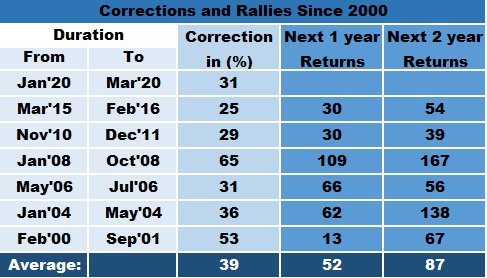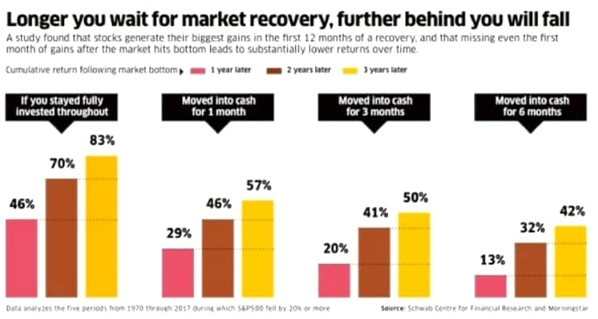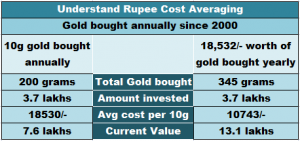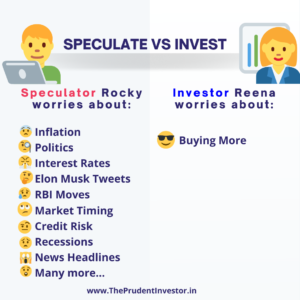As the Corona virus has spread over the past month, stock markets across the world have crashed and India is no exception with the market plunging about 30%. A generation of investors is experiencing its first genuine financial crisis. For many, no amount of rational thinking can ease the pain of seeing a fourth of your investments evaporate in a few weeks for the first time.
Is this happening for the first time?
The current sell-off on Dalal Street is the worst many Indians have seen (or will see) in their lifetimes. But this is not the first time investors have scrambled to pull their money out of the stock market. Let’s compare how the current market collapse compares with other corrections since 2000 in the following table:

As we can see, there have been several corrections in the past but the market has rallied significantly after such corrections.
Many investors fear a market crash. Long-term investors, however, relish it for the opportunity it presents. If you can play your cards right during the market meltdown, you can set yourself up to become a crorepati once the market stabilizes.
The million-dollar question is whether the markets will correct more, or have we seen the worst and the markets will now rally?
While there is no way of knowing how far a fund will fall in a crisis, or how long it will take to recover, for long-term investors, it is important to bear in mind that a difficult drop can often be followed by a big bounce – and if you sell at the bottom, you’ll miss out on the recovery. Even though there’s no way to say the bottom is at hand, the conditions that make bargains available certainly are materializing. Given the price drops and selling we’ve seen so far, I believe this is a good time to invest.
Buy Low
Obvious isn’t it? Maybe, but that’s not the way markets work. When prices are high, a lot of investors are buying a lot of stocks. Prices are low when demand is low. Investors have pulled back, people are discouraged and pessimistic. When almost everyone is pessimistic at the same time, the entire market collapses.
It is extremely difficult to go against the crowd.
To buy when everyone else is selling or has sold. To buy when things look darkest, to buy when so many experts are telling you that it is risky right now. But if you buy the same securities everyone is buying, you will have the same results as everyone else. By definition, you can’t outperform the market if you buy the market. And chances are if you buy what everyone is buying you will do so after it is already overpriced.
So simple in concept: So difficult in execution! What if I muster the courage and invest tomorrow and then the market tanks another 20-30%? In January 2008, Sensex was at 21k. By July 2008, it dropped to 13k and hit rock bottom in March 2009 at 8160.

In July 2008 at 13k, if someone would have invested feeling the markets have corrected enough and now is probably a good time to get in. Even they would have made double digit returns, in spite of the market correcting another 40% and going all the way down to 8k.
What should one do?
Stop being afraid of what could go wrong and think of what could go right. The comfort zone is a psychological state in which one feels familiar, safe, at ease, and secure. You never change your life until you step out of your comfort zone; change begins at the end of your comfort zone.
Currently sitting on cash may give us peace of mind, but no one has become successful operating from the comfort zone. You might be tempted to hoard any cash you have with all of the uncertainty related to the coronavirus outbreak. That’s a fearful stance: the best chance to deploy capital is when things are going down.
When it comes to deploying money, investors get cold feet in a bear market. Even when the market recovers they hesitate to invest, only to realize they have missed the bus.

Most of us would like to wait and get clarity and signs that we are winning the battle to contain Corona virus and only then would we like to invest. As in the past, if you are waiting for clarity, then you will have to pay the price of clarity. People who stayed in cash in 2008 didn’t buy till the Sensex had doubled itself in 2009.
Don’t react emotionally: Stick with your plan.
Do not give in to your gut, which might cause a momentary lapse in judgment. – If you do not want to buy, that is fine. But please do not sell your investments in haste. People lock in their losses by pulling out at the bottom of a downturn.
The reason you made a long-term plan in the first place is because you do not need access to the money you’ve invested in the next year (or the years after) but decades from now. In 2040, you will not care what the market did in 2020. If you have ongoing SIPs, do not stop them now. Or else, the entire purpose of systematic investing would backfire.
Have an emergency fund.
Keeping a portion of your savings in something liquid that isn’t subject to market movements can ward off panic when your investments go down.
Invest lump sum.
If you have money you can afford to invest with a long term view, now a good time to invest in tranches, apart from your existing SIP commitments. So if you have 10 lakhs to invest, put in 2.5 lakhs over the next 2-3 months in a well diversified portfolio as per your asset allocation.





Yes correct every Invester must to take this opportunity to make him Crorepati for certain period,invest wisely to achieve the goal at set right time
Absolutely!